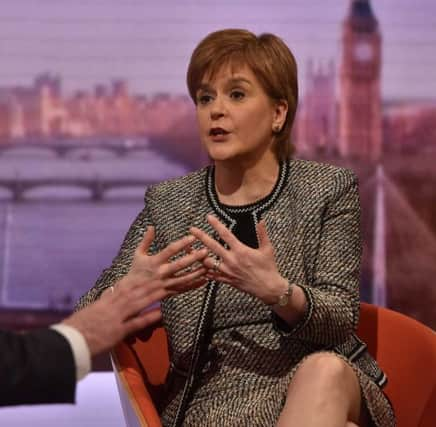Will Nicola Sturgeon call Indyref2 later this year?


After a bruising result in the snap general election in June, the First Minister promised to reflect on her previously announced plans to pursue a ‘Section 30’ order, allowing Scotland the legal ability to hold another referendum on independence.
Then came a pause, or ‘reset’, announced last summer, when Ms Sturgeon acknowledged that the public were sick of having to troop to the ballot box.
Advertisement
Hide AdAdvertisement
Hide AdThe SNP leader did, however, indicate that it was still more than likely that a second referendum would be held before the next Holyrood election in 2021.
Yesterday, however, she told the BBC’s Andrew Marr that a decision would be announced before the end of 2018, but after October.
We look at why the delay has occurred, what has changed since the vote in 2014, and how likely it is that a decision to hold a second referendum will be announced.
What has changed
Harold Wilson famously said that a week is a long time in politics, and it has been well over three years since the referendum of 2014.
Another referendum, two Westminster elections, a Holyrood election and a Scottish local election have ensured that political upheaval in Scotland is never more than a vote away.
Riding a wave of post-indyref support, the SNP surged to an unprecedented victory in the UK election of 2015.
Amid a strong Conservative performance, the party lost their overall majority in Holyrood in 2016, and subsequently lost 21 MPs in June’s election.
In the latter two elections, the Tories campaigned relentlessly on the issue of a second referendum, despite the Brexit referendum in between that many expected to boost support for Ms Sturgeon’s vision.
Advertisement
Hide AdAdvertisement
Hide AdBrexit may have delivered the ‘material change’ to Scotland that could trigger another vote (at least in constitutional terms), but polling hasn’t undergone much of a shift.
Polling and campaigning
There was a brief period when it seemed like the shock decision by UK voters to back leaving the European Union would boost the independence cause.
The three polls in the immediate aftermath of the Brexit referendum last year showed independence with leads of 7, 3, and 6 per cent respectively.
Since then, however, only one credible national poll has shown Ms Sturgeon’s vision with a lead, an STV/Ipsos Mori survey in March of 2017.
The post-Brexit response from the First Minister seemed to tease that a new referendum would be called relatively quickly.
Within a year, Ms Sturgeon had demanded the right to be given the Section 30 order authorizing one, though that was rejected by the UK Government.
That could have influenced the First Minister’s decision but there remain a host of other factors that have seen a final decision delayed until the end of the year.
Internal and External factors
The SNP’s membership exploded in the aftermath of the 2014 referendum, rising to over 120,000, reckoned at the time to be around 2 per cent of the Scottish electorate.
Advertisement
Hide AdAdvertisement
Hide AdWhile it has fallen slightly, there are still believed to be over 100,000 SNP members, all of whom, it can be reasonable assumed, believe in independence.
They don’t think as one, and as the leader of a truly mass-membership party, Nicola Sturgeon has to continually balance her decisions against what those members want her to do.
Many hard-liners would prefer a referendum sooner rather than later, but with the polling nowhere near favourable, the First Minister seems understandably reticent.
Externally too, there are pressures on Ms Sturgeon.
The Conservatives have had electoral success in portraying her as obsessed with independence, and ready to call a second referendum at any moment.
If independence is off the agenda for the foreseeable future, then Ruth Davidson’s party will have to step up their detailed policy offering to the Scottish electorate, something that has been thus far lacking as they use independence to increase their representation in Holyrood and Westminster.
Should the First Minister signal her intent to call a referendum this year, however, opposition parties believe they can still use that threat to win support.
In delaying a final decision until the last quarter of this year, Nicola Sturgeon has certainly bought herself some time to consider all of these factors.
But that doesn’t mean that making that decision is going to be any easier when the time comes.
